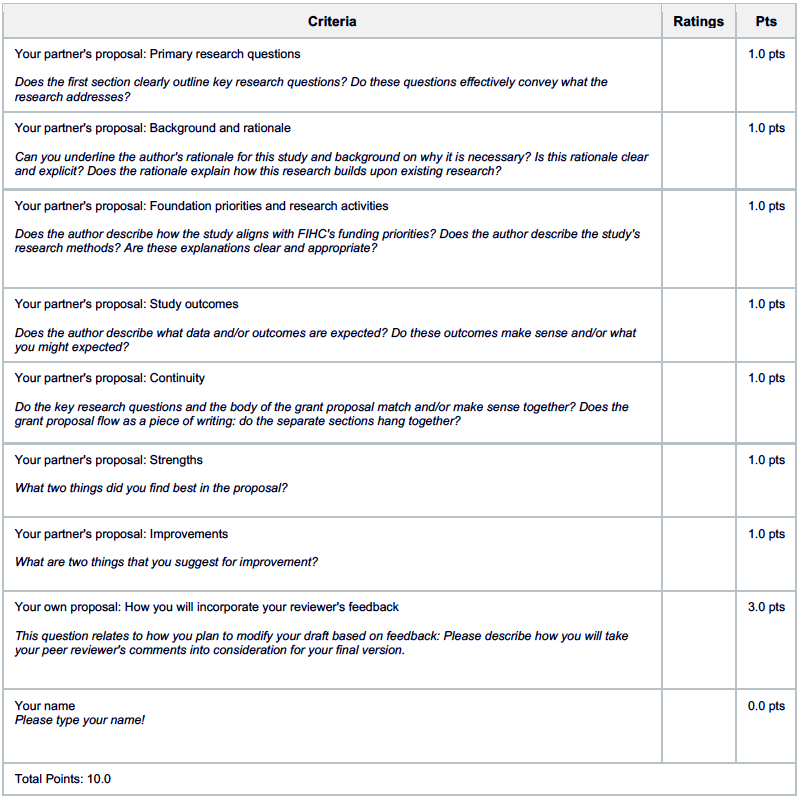PROFESSOR SARA MCKINNON
COMMUNICATION ARTS 260
Draft due Monday, March 5th, 12pm (noon). Peer review rubric due Wednesday, March 7th, 11:59pm.
Please use the hard copy of your peer review activity from the in-person writing workshop to complete this peer review rubric.
You may paraphrase your comments, but you must be accurate and honest. Please also honestly indicate how you incorporated your peer’s comments into your final draft; is it not required that you incorporate your peer’s comments, but you do need to explain why/why not.
You’ll be using a peer review rubric on a 10 point scale. Full credit is subject to TA/instructor review, and any grade adjustments will be communicated to you by your TA.
The grant proposal prompt and requirements are listed below.
Imagine you are applying for funding for the research described in the scholarly article you’ve read for this assignment by Braithwaite & Baxter (2006) entitled “‘You’re My Parent but You’re Not’: Dialectical Tensions in Stepchildren’s Perceptions About Communicating with the Nonresidential Parent.” You will need to convince the funder, Foundation for Improved Human Communication (FIHC), that your research is 1) necessary, 2) important, 3) aligned with their funding priorities, and 4) able to achieve meaningful results.
Typically, grant proposals are written for funding for future research, although past studies are used to justify this future work.
For the sake of this assignment, we will imagine that the study has not yet occurred. We will also only focus on the proposal narrative (most proposals also include a budget section).
The goal of this assignment is to demonstrate your comprehension of communication research studies and ability to explain them clearly, and persuasively, to others. You will also become familiar with a common form of writing in the non-profit and public sectors: grant writing.
You will turn in a draft of this press release on March 5 by 12pm NOON.
On March 5 or 6th, you will have a writing workshop where you will get peer and TA feedback and assistance with strengthening your thesis statement and overall argument. You will complete your Peer Review Rubric by March 7th at 11:59pm. You will then turn in your final version by March 9th at 11:59pm.
As in most grant proposals, each question in the form will contain a character count limit. You should strive to be accurate, concise, and persuasive in your answers to these questions. To ensure you are maximizing your character counts, there is also a minimum character requirement for each question. Include your character count at the end of each section of your proposal.
The questions are as follows:
1. Primary Research Questions: What are the key questions this research addresses? (250-500 characters)
2. Background and Rationale: Why is this study necessary? What research does it build upon, and how? (1,000-1,500 characters)
3. Foundation Priorities: How does this study align with FIHC’s current funding priorities (listed below)? (1,000-1,500 characters)
4. Proposed Research Activities: Describe the study’s research methods (and participants, if applicable). (1,000-1,500 characters)
5. Study Outcomes: What kind of data and/or outcomes will the study produce? Be specific. (250-1000 characters)
6. Study Implications: What are the potential social impacts of this research? How will it improve our knowledge of human communication and behavior? (1,000-1,500 characters)
Foundation for Improved Human Communication’s (FIHC) 2017-2018 Priorities
FIHC is interested in funding scholarly research that improves public understanding of human communication and behavior.
For the 2017-2018 cycle, we are particularly interested in research that:
– improves our collective understanding of the functions of communication.
– explains how we address social problems via communicative engagement.
– encourages the building of effective communities.
In the previous grant cycle, we funded $52 million in communication research. The following is a sample of the studies we supported:
$60,000 – University of Minnesota – for research exploring civic deliberation in rural communities
$60,000 – Drury University – to support a rhetorical analysis of community responses to political campaign ads in Missouri
$80,000 – University of New Mexico – for a study of deception theory in extended families
$100,000 – Beloit College – for a pilot project testing athletes’ responses to negative media framing
Peer Review Rubric: Grant Proposal
